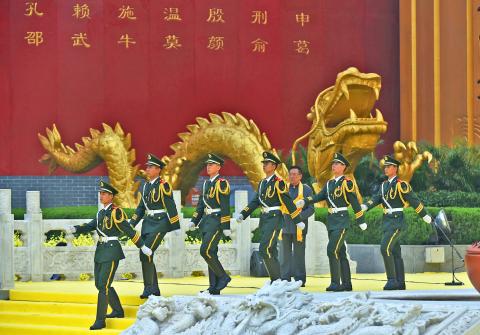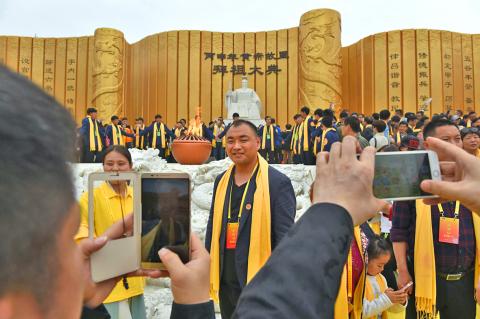Scarves emblazoned with red dragons draped over their black business suits, Chinese officials lit incense and bowed solemnly at the feet of a mythical ancestor known as the Yellow Emperor.
The avowedly atheist Chinese Communist Party (CCP) is promoting worship of the ancient figure as it seeks to bolster its legitimacy — and emphasize Chinese blood ties, including with Taiwan ahead of the inauguration of president-elect Tsai Ing-wen tomorrow.
Thousands gathered in the heartland province of Henan, where the Yellow Emperor — described in archaic annals and present-day school textbooks as the founder of Chinese civilization — is said to have been born 5,000 years ago.

Photo: AFP
Shots from gold-painted cannon began the annual ceremony and the crowd, many in replica antique costume, listened to a booming announcer heralding the “ancestor of the Chinese nation.”
High-ranking cadres — including the province’s top official and a former Chinese vice culture minister — processed up a red carpet, placed offerings in front of an altar and gazed into the statue’s chiseled visage, before bowing.
Lydia Zhou, an investment manager who flew from Shanghai to attend, said: “I’m here to worship. He is our ancestor and this is his birthplace.”

Photo: AFP
The lauding of an individual comes as Chinese President Xi Jinping (習近平) is increasingly lionized in state-run media and the announcer echoed his slogans: “Revive China, a one-hundred-year dream, ruling by law, moderate prosperity for all.”
Historians say there is little evidence the Yellow Emperor actually existed, but school textbooks widely describe him as the founder of Chinese culture and the ancestor of all Chinese — including its 55 official ethnic minorities, some of whom chafe against identifying as Chinese.
The same books assert China has existed for 5,000 years since his birth, though historians date the first Chinese dynasty — covering a tiny fraction of the present nation — to about 1600 BC.
The CCP attempted to outlaw religion after taking power in 1949.
Under Mao Zedong (毛澤東), “Yellow Emperor worship was seen as feudal superstition,” said Ren Dayuan (任大援), vice chairman of the Association for Yan Huang Culture of China.
However, now the party says religion can be harnessed for social good ahead of it eventually melting away with economic progress.
Searching for tourist and investment income, officials in the emperor’s supposed birthplace of Xinzheng revived the ceremony in the 1990s and it was endorsed by the Chnese State Council in 2008.
With economic growth slowing, the ruling party has turned to a grab-bag of traditions as it attempts to portray itself as a natural outgrowth of Chinese culture.
“These events are becoming bigger and bigger, because the state needs them to explain its legitimacy,” said Zhu Dake (朱大可), a cultural critic at Shanghai’s Tongji University.
At the same time it is looking to forge a single identity for an ethnically diverse population.
“The state needs this bloodline,” Zhu said. “It’s a political strategy. China is a multiethnic country. Chinese are a mixed-up thing, rather than descendants of a single ancestor.”
The message of unity applies to all ethnic Chinese, including the diaspora abroad and those in Taiwan, where Tsai — from the traditionally pro-independence Democratic Progressive Party — is to be inaugurated tomorrow.
Among those lighting incense in Xinzheng last month was the head of Beijing’s Taiwan Affairs Office.
Similarly, former Chinese Nationalist Party (KMT) vice chairman Chun Chun-po (詹春柏) attended another event at the reputed site of the emperor’s death in neigboring Shaanxi Province, telling local media: “As descendants of the Yellow Emperor, this is the happiest event in life.”
His remarks recalled those of President Ma Ying-jeou (馬英九) at last year’s first cross-strait summit since 1949 in Singapore when he said that people on both sides of the Taiwan Strait were “of Chinese nationality” and “children of the Yellow Emperor.”
For his part Xi offered: “We are brothers connected by flesh even if our bones are broken, we are a family whose blood is thicker than water.”
Both men’s declarations were disparaged by many Taiwanese, where Tsai’s message of Taiwanese identity resonated with voters and surveys show people feel increasingly separate from China, but on the other side of the strait, where the ruling party tightly controls presentations of history, there are few such concerns.
After the official ceremonies at the Shaanxi tomb complex — refurbished a decade ago at a cost of about 250 million yuan (US$38 million) — thousands of ordinary citizens poured in, many prostrating themselves before the emperor’s statue.
“He definitely existed, there are ancient books and bone carvings which prove it,” student Shen Yuyan said. “He’s the ancestor of all Chinese ethnic groups and of Taiwanese.”

Four people jailed in the landmark Hong Kong national security trial of "47 democrats" accused of conspiracy to commit subversion were freed today after more than four years behind bars, the second group to be released in a month. Among those freed was long-time political and LGBTQ activist Jimmy Sham (岑子杰), who also led one of Hong Kong’s largest pro-democracy groups, the Civil Human Rights Front, which disbanded in 2021. "Let me spend some time with my family," Sham said after arriving at his home in the Kowloon district of Jordan. "I don’t know how to plan ahead because, to me, it feels

The collapse of the Swiss Birch glacier serves as a chilling warning of the escalating dangers faced by communities worldwide living under the shadow of fragile ice, particularly in Asia, experts said. Footage of the collapse on Wednesday showed a huge cloud of ice and rubble hurtling down the mountainside into the hamlet of Blatten. Swiss Development Cooperation disaster risk reduction adviser Ali Neumann said that while the role of climate change in the case of Blatten “still needs to be investigated,” the wider impacts were clear on the cryosphere — the part of the world covered by frozen water. “Climate change and

Poland is set to hold a presidential runoff election today between two candidates offering starkly different visions for the country’s future. The winner would succeed Polish President Andrzej Duda, a conservative who is finishing his second and final term. The outcome would determine whether Poland embraces a nationalist populist trajectory or pivots more fully toward liberal, pro-European policies. An exit poll by Ipsos would be released when polls close today at 9pm local time, with a margin of error of plus or minus 2 percentage points. Final results are expected tomorrow. Whoever wins can be expected to either help or hinder the

DENIAL: Musk said that the ‘New York Times was lying their ass off,’ after it reported he used so much drugs that he developed bladder problems Elon Musk on Saturday denied a report that he used ketamine and other drugs extensively last year on the US presidential campaign trail. The New York Times on Friday reported that the billionaire adviser to US President Donald Trump used so much ketamine, a powerful anesthetic, that he developed bladder problems. The newspaper said the world’s richest person also took ecstasy and mushrooms, and traveled with a pill box last year, adding that it was not known whether Musk also took drugs while heading the so-called US Department of Government Efficiency (DOGE) after Trump took power in January. In a